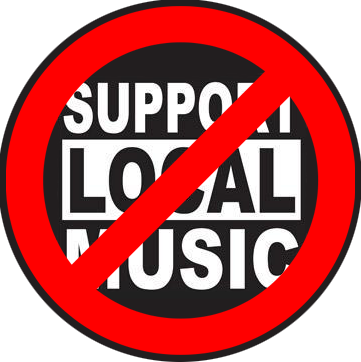by Steve “Red” Lasner
I go to blues jam sessions hosted by local music venues occaisionally, where seasoned musicians, students and beginners are encouraged to participate. They play mostly traditional pieces: “The Thrill is Gone,” “Stormy Monday,” “The Sky Is Cryin'” and many other traditional blues guitar songs. Apparently, if anyone other than your mother and best friend are listening, it is deemed “public performance” and therefore requires a license.
Copyright law requires that any venue where music is performed publicly, from cheerleading competitions and mortuaries to nightclubs and stadiums, have a performance license, and recorded music is subject to license fees as well. The three US-based Performance Rights Organization (PROs) — ASCAP, BMI, and SESAC — collect the fees and distribute them to their members. The problem is that because the PROs want licencing fees for these performances so badly, local music scenes and countless up-and-coming musicians are becoming victims by way of committing a victim-less crime. Local live music venues are receiving threatening letters, casual jam sessions are experiencing a crackdown, and amateur guitar players are losing opportunities to build up their performance chops due to these ridiculous and excessive demands for licenses.
With the music industry in steep decline, PROs are ramping up their pursuit of the little guys, who acknowledge that songwriters are entitled to compensation but are angry and frustrated at what they see as unfair targeting of small businesses and non-profits that make little to no money from the music they present. The PROs have been criticized for years for their aggressive stance. For example, in the mid-1990s, ASCAP bowed to public outcry after attempting to collect licensing fees from the Girl Scouts for singing campfire songs. They now charge the Girl Scouts a symbolic $1 a year.
Small business owners who host live music are required to buy licenses from the PROs or be subject to lawsuit. Each PRO files about hundreds of lawsuits every year, but the good news is that it is usually a last resort, often following years of attempts to enforce compliance with the law. Fewer than 10 percent of these copyright infringement suits actually go to trial because once business owners get attorneys, they find out they don’t have a prayer of winning. Penalties in court range from $750 all the way up to $30,000 per song. These threats make it very difficult small business owners to survive, and the amateur musicians suffer as a result.
In the end, I think the law is fairly clear, albeit perhaps a bit outdated, and the PROs really are just doing their jobs (unfortunately). The severity of the consequences is certainly up for debate, and while songwriters and artists certainly should be paid something for their original work, the PROs should not be desroying the live music scene in order to do so.
So what should be done? If it was up to me, I would say to hell with the PROs, let’s start a revolution and free the music, but obviously that is not a viable option. A compromise seems necessary, but how? Really, it is David vs. Goliath out there, and I just hope this story ends the same way.
Check out guitar lessons by Steve “Red” Lasner’s in his latest course, Blues Expose.
